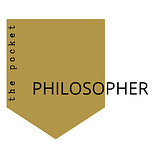Thought
What it is not is a particular state that, if you were really good at meditating, you’d be there and then you could get back to it whenever you wanted. And that’s your home base that never deviates. If you try to approach it that way, you’ll always be striving to get to some special state that you’re imagining is what mindfulness is all about and actually missing how special the condition of this present moment is, no matter what.
—Jon Kabat-Zinn in an interview with Barry Boyce
Application
Mindfulness has been a huge topic to tackle this week which can feel a bit overwhelming, but that latitude has also been very helpful in some ways as well. In the last few days, we approached mindfulness as the philosophical suspense of judgement, as a spiritual discipline, and today from the lens of practical, everyday advice.
We’ll go a bit deeper in his bio below, but Jon Kabat-Zinn is a Dr. of Molecular Biology. Unlike other molecular biologists, Jon was intrigued by the mind, the body, and the space in between. He’s spent his professional (and much of his personal) life examining and testing the boundaries of mindfulness.
The greatest wisdom that Jon leaves for us can be found in the above quote. The type of mindfulness he encourages us to cultivate is the kind which can only be found when we forget we are looking for it.
In many respects, the idea of being mindful, practicing meditation, controlling your mind, becoming a yogi—whatever the case may be, can put up a barrier mentally to simply moving into the seat of an observer.
And at the heart of mindfulness is that simple shift from an actor who is wrapped up in the drama of the play, to one in the audience observing safely from their seat.
The capacity to shift into this space within yourself has been scientifically proven (largely by Jon’s work) to alter your body in profound ways—shifting hormones, lowering the fight or flight response, healing trauma, addressing ailments, and reducing stress and its associated negative externalities.
This reality reminds me of an old allegory Alan Watts was fond of saying as a result of his time studying Hindu spirituality. He would say,
Behind the scene, under the surface of reality, you are all actors, marvelously skilled at playing parts and in getting lost in the mazes of your own minds and the entanglements of your own affairs, as if this were the most urgent thing going on. But behind the scenes, in the green room - in the very back of your mind and the very depth of your soul - you always have a sneaking suspicion that you might not be the you that you think you are.
And the gap between the stage and green room is found in the space, some might call it the slack, of everyday life where one can notice that this play on this stage might not be as all-consuming as we thought or hoped.
And so Jon Kabat-Zinn encourages us not to create this hyper-ceremonialized state we feel like we must achieve, but rather to sink back into the posture of one who witnesses rather than one who performs.
And this is a skill we take with us anywhere—not meant to make us happy or liberated or free, but meant to help us learn, notice, and grow in our daily activities, mundane and important.
Backstory
Jon Kabat-Zinn has revolutionized the way that millions look at mindfulness, meditation, and psycho-spiritual growth. What might be important to note before we go further, is that this mindfulness that Jon teaches is not necessarily in competition or even related to the meditation we discussed yesterday.
While there is definitely some overlap, the meditative practices that originated in the Indus River Valley are deeply connected to an entire culture, community, and way of life. More than that, the practice and communal sharing of mindfulness in that setting is a deeply religious and spiritual affair.
The mindfulness we are discussing today is not better or worse, but serves a different purpose. This mindfulness is the result of hypothesis, research, and the study of human health. It draws on traditions found in Hindu and Buddhist texts and practices, but it is built for accessibility to a largely modern, western audience.
Again, this is not good or bad, but I do feel it is important to acknowledge that distinction so as not to confuse or appropriate the culture of the ancient sages.
Jon has, in his own right, transformed thousands if not millions of lives in his simple, accessible teachings that allow people to have small glimpses of cosmic awareness, even if only briefly or in small increments.
If you have access to it, Jon teaches a wonderful Masterclass on mindfulness that is simple, easy, but profoundly elegant—I’d definitely recommend if you find this topic interesting.
Jon serves as Professor of Medicine Emeritus at the Massachusetts School of Medicine, and founder of both Mindfulness-Based Stress Reduction (MBSR) and the Center for Mindfulness in Medicine, Health Care, and Society.
He’s authored multiple books on the topic (which have been translated into multiple languages) which make his findings available and digestible to many.
In sum, everyday mindfulness begins with slack in your life, off-time to simply sit and notice. And within those spaces, we often find that there is a lot more to observe and learn than perhaps we knew—even about ourselves.
Friends, I hope this was helpful, and I’m excited to wrap up our study together on this topic tomorrow.
Until then, please share with a a friend and leave a comment for the group,
Matt
References:
https://www.mindfulnesscds.com/pages/about-the-author
https://www.mindful.org/everyday-mindfulness-with-jon-kabat-zinn/
https://www.goodreads.com/quotes/8975289-behind-the-scene-under-the-surface-of-reality-you-are#:~:text=behind%20the%20scene%2C%20under%20the%20surface%20of%20reality%2C%20you%20are,most%20urgent%20thing%20going%20on.
https://www.masterclass.com/classes/jon-kabat-zinn-teaches-mindfulness-and-meditation















Share this post